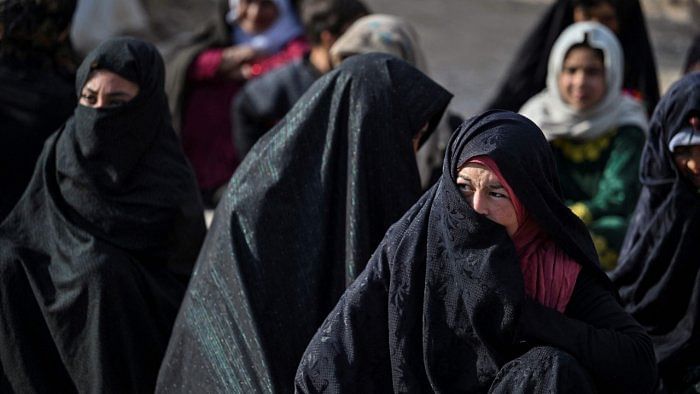
In August last year, when the Taliban fighters entered Kabul, educated Afghan girls messaged their friends, colleagues and relatives living in the country and abroad - "Get me out of this place; the Taliban will hang me!". The efforts to write letters and emails to obtain visas went in vain.
A recent report by Save the Children shows that 46 per cent of girls have dropped out of school, and 26 per cent suffer from depression. The educated and empowered girls of Afghanistan feared that the issues of women's rights and protection were not being tabled in the ongoing talks between the US representatives and the Taliban in Doha. Even when Ashraf Gani was the Afghanistan president, women would raise concerns about security, freedom and education in media and international forums, sensing the inclusion of the Taliban in the political process. But women did not get heard.
Even after capturing Kabul, several Taliban leaders assured the international media that girls' education is a priority for the Taliban and that women can continue working in offices if they wear hijab-burkha. In reality, the Taliban has treated women as they did in their earlier regime from 1996 to 2001.
The Taliban had then ordered universities to have separate rows of girls and boys in the class and put a curtain between them. By March 2022, the Taliban banned girls from secondary schools. Now girls are allowed access only to primary education.
Moreover, the Taliban's top leader, Hibatullah Akhundzada, said that women should not come out if they are not entirely veiled. Due to discrimination and harsh attitude, thousands of women have had to leave their government and non-government jobs.
Despite the challenges, a new generation of women entrepreneurs, lawyers, doctors, artists, and journalists emerged in this century's first two decades. However, many had to leave the country, and some still live underground in distress. In the Taliban regime, single women are not allowed to travel in Afghanistan today.
All this is happening in Afghanistan, where Emperor Habibullah Khan established the Habibiya High School in 1903. In the 1920s, Emperor Amanullah Khan launched hundreds of girls' schools for modern education. The co-ed classes for standards first and second started in 1928. Girls and women got equal rights in 1964, and Afghan women emerged as a symbol of empowerment in the South Asia region. A postage stamp with a picture of a woman in the traditional Afghan dress was also issued in the 1960s. But today, this country does not allow girls to study beyond class seven.
Read | Women desperate to work in Taliban-ruled Afghanistan
A few months ago, a group of Afghan girls living abroad shared a few old pictures of the family on social media exhibiting the traditional dress of Afghan women and protesting the full veil imposed by the Taliban. These girls accused the Taliban of promoting Arabic-style clothing in the name of culture in Afghanistan. During their earlier regime in 1996, the Taliban tried to introduce Arabic in schools. Due to the dominance of the Dari and Pashto languages, they did not succeed.
The Taliban have been in power in Afghanistan for the past year. None of the significant countries has recognized the Taliban's government, but most governments are in dialogue with the Taliban leaders. Fellow citizens are in dire need of humanitarian aid, especially food, medicine and other medical facilities, but unless the investment gets made in girls' education and public health, how can a country be self-dependent? Why are the world leaders hesitant to speak on the issues of Afghan women?
A year ago, Afghanistan's enrolment of girls in primary schools was above 40 per cent. Now girls are forced to stay back at home. Four hundred private schools have been shut down recently, affecting nearly 10,000 students. Some have shifted their families to Pakistan, Iran and Turkey so girls can continue their schooling.
From 2010 to 2020, new public and private universities met the young Afghans' educational aspirations. Thousands of young Afghan women were learning technology and English to contribute to rebuilding the country and society. The new leadership of Afghan women emerged in politics as well. But suddenly, the scenario changed, and women were forced to stay home.
On August 13, a group of courageous women took out processions on the streets of Kabul. Women demanded their right to education, employment and freedom. When the
group reached the front of the Ministry of Education in Kabul, armed Taliban fighters hit the protesting women with gunshots, fired shots into the air and dispersed them. Phones of many women were also snatched.
Once I asked an Afghan colleague what challenges women face in his country. She paused before replying, "Whatever challenge you can imagine, we have to fight it." This educated woman wanted to do something for her country but moved to another country, concerned for her safety.
The cycle of violence in Afghanistan is not over. Every week explosions take place, killing innocent citizens, including children. The world is quiet about the atrocities on women.
Mental health challenges are bound to increase in the context of hopelessness. Young girls are struggling to survive and breathe in a public space. Couldn't world leaders speak in one voice for the girls in Afghanistan, demand sanctions against the regime and persuade Afghan women to stand and speak for themselves? People outside Afghanistan might be scared to check whether all those girls who sent messages to save themselves are still alive.
(An educationist and founder of the School of Open Ideas, Sanjeev Rai has worked earlier as an Education Advisor for an international NGO working in Afghanistan)
Disclaimer: The views expressed above are the author's own. They do not necessarily reflect the views of DH.